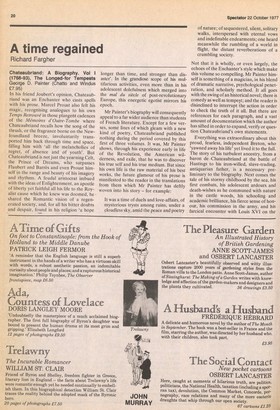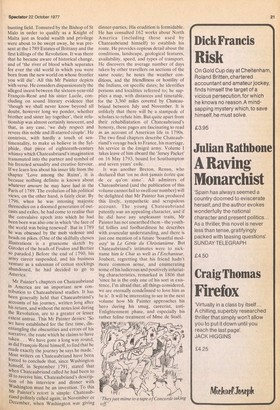A time regained
Richard Farg her
Chateaubriand: A Biography. Vol I (1768-93), The Longed-for Tempests George D. Painter (Chatto and Windus £7.95) In his friend Joubert's opinion, Chateaubriand was an Enchanter who casts spells with his prose. Marcel Proust also felt his magic, recognising analogues to his own Temps Retrouve in those plangent cadences of the Memoires d'Outre-Tombe where Chateaubriand recalls how the song of the thrush, or the fragrance borne on the Newfoundland breeze, involuntarily transported him back through time and space, filling him with 'all the melancholies of regret, of absence and of youth'. But Chateaubriand is not just the yearning Celt, the Prince of Dreams, who surpasses Flaubert and Barres and even Proust himself in the range and beauty of his imagery and rhythms. A feudal aristocrat imbued with the ideas of Enlightenment, an apostle of liberty yet faithful all his life to the Royalist cause which he knew was doomed, he shared the Romantic vision of a regenerated society, and, for all his bitter doubts and despair, found in his religion 'a hope longer than time, and stronger than disaster'. In the grandiose scope of his multifarious activities, even more than in his adolescent dolefulness which merged into the mal du siècle of post-revolutionary Europe, this energetic egotist mirrors his epoch.
Mr Painter's biography will consequently appeal to a far wider audience than students of French literature. Except for a few verses, some lines of which gleam with a new kind of poetry, Chateaubriand published nothing during the period covered by this first of three volumes. It was, Mr Painter shows, through his experience early in life of the Revolution, the American wilderness, and exile, that he was to discover his true self and his true medium. But since his own life is the raw material of his best works, the future glamour of his prose is manifested to the reader in the translations from them which Mr Painter has deftly woven into his story — for example: It was a time of duels and love-affairs, of mysterious trysts among ruins, under a cloudless sky, amid the peace and poetry of nature; of sequestered, silent, solitary walks, interspersed with eternal vows and indefinable endearments; one heard meanwhile the rumbling of a world in flight, the distant reverberations of a crumbling society.
Not that it is wholly, or even largely, the echoes of the Enchanter's style which make this volume so compelling. Mr Painter himself is something of a magician, in his blend of dramatic narrative, psychological penetration, and scholarly method. It all goes with the swing of an historical novel; there is comedy as well as tempest; and the reader is disinclined to interrupt the action in order to check the truth of it all. But there are references for each paragraph, and a vast amount of documentation which the author has sifted in order to expand, verify or question Chateaubriand's own statements.
Everything was extraordinary about this proud, fearless, independent Breton, who 'yawned away his life' yet lived it to the full. The story of his turbulent ancestry, from a baron de -Chateaubriand at the battle of Hastings to his iron-willed, slave-trading, antiquarian father, is a necessary preliminary to the biography. Next comes the tale of his stormy childhood by the sea, his first combats, his adolescent ardours and death-wishes as he communed with nature in the castle woods, his schooling and academic brilliance, his fierce sense of honour, his commission in the army, and his farcical encounter with Louis XVI on the hunting field. Tonsured by the Bishop of St Maio in order to qualify as a Knight of Malta just as feudal wealth and privilege were about to be swept away, he was present at the 1789 Estates of Brittany and the first killings of the Revolution. It was there that he became aware of historical change, and of 'the river of blood which separates for ever the old world in which you were born from the new world on whose frontier you will die'. All this Mr Painter depicts with verse. He considers dispassionately the alleged incest between the sixteen-year-old Francois-Rene and his sister Lucile, concluding on sound literary evidence that 'though we shall never know beyond all doubt, however long we ponder, whether brother and sister lay together', their relationship was almost certainly innocent, and that, in any case, 'we duly respect and revere this noble and ill-starred couple'. He contrives, with hardly a touch of sentimentality, to make us believe in the Sylphide, that piece of eighteenth-century whimsy which Chateaubriand's imagination transmuted into the partner and symbol of his frenzied sexuality and creative fervour. If we learn less about his inner life from the chapter 'Love among the Ruins', it is because nothing definite is known about whatever amours he may have had in the Paris of 1789. The evolution of his political views, on the other hand, is fairly clear. By 1796, when he was intoning majestic threnodies on a doomed generation of outcasts and exiles, he had come to realise that the convulsive epoch into which he had been born was also one in which 'the face of the world was being renewed'. But in 1789 he was obsessed by the mob violence and heads on pikes. (One of the skilfully chosen Illustrations is a gruesome sketch by Girodet of the heads of Foulon and Bertier SO paraded.) Before the end of 1790, his army career suspended, and his business venture as a salesman of cotton stockings abandoned, he had decided to go to America.
Mr Painter's chapters on Chateaubriand in America are an important new contribution to Chateaubriand studies. It has been generally held that Chateaubriand's accounts of his journey, written long after his return, and without the notes lost during the Revolution, are to a greater or lesser extent untrue. This Mr Painter denies: `So we have established for the first time, disentangling the obscurities and errors of his narrative, the route which he claims to have taken . . . We have gone a long way round, as did Francois-Rene himself, to find that he made exactly the journey he says he made.' Most writers on Chateaubriand have been forced to conclude that, since Washington himself, in September 1791, stated that When Chateaubriand called he had been to ill to receive him, Chateaubriand's description of his interview and dinner with Washington must be an invention. To this Mr Painter's retort is simple: Chateaubriand politely called again, in November or December, when Washington was giving dinner-parties. His erudition is formidable. He has consulted 162 works about North America (including those used by Chateaubriand himself) to establish his route. He provides copious detail about the conditions, landscape, geological features, availability, speed, and types of transport. He discovers the average number of days taken by other travellers on sections of the same route; he notes the weather conditions, and the friendliness or hostility of the Indians, on specific dates; he identifies persons and localities referred to; he supplies a map, with distances and timetable, for the 3,360 miles covered by Chateaubriand between July and November. It is unlikely that there will be a stampede of scholars to refute him. But quite apart from their rehabiliatation of Chateaubriand's honesty, these pages are fascinating to read as an account of American life in 1790s. The two final chapters describe Chateaubriand's voyage back to France, his marriage, his service in the émigré army. Volume I takes leave of him aboard the 'Jersey Packet' on 16 May 1793, bound for Southampton and seven years' exile.
It was another Breton, Renan, who declared that 'on ne doit jamais ecrire que de cc qu'on aime. All admirers of Chateaubriand (and the publication of this volume cannot fail to swell our number) will be delighted that Mr Painter has produced this lively, sympathetic and scrupulous account. The young Chateaubriand patently was an appealing character, and if he did have any unpleasant traits, Mr Painter has not unearthed them — the youthful follies and foolhardiness he describes with avuncular understanding, and there is just one mention of a future 'boastful modesty' in Le Genie du Christianisme. But Chateaubriand's intimates were to nickname him le Chat as well as l'Enchanteur. Joubert, regretting that his friend hadn't more common sense, and enumerating some of his ludicrous and positively infuriating characteristics, remarked in 1806 that 'since he is the only one of his sort in existence, I'm afraid that, all things considered, we are eternally condanned to love him as he is'. It will be interesting to see in the next volume how Mr Painter approaches his hero during his smug, careerist, antiEnlightenment phase, and especially his rather feline treatment of Mme de Stael.



































 Previous page
Previous page